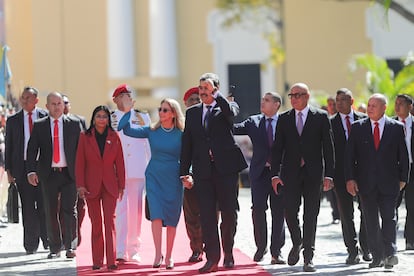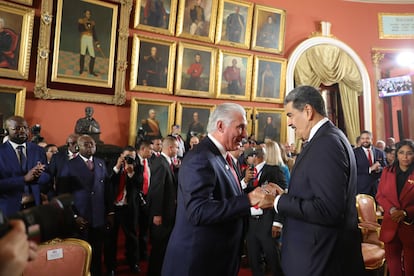Latin America turns its back on Maduro’s ‘fraudulent’ inauguration as president of Venezuela
Argentina said the Chavista leader clings to his position ‘by imposing himself through fear, aggression, murder and prison.’ Other large countries, on the political left and right, also refused to recognize him as a legitimate leader


Latin America refuses to recognize Nicolás Maduro as the legitimate president of Venezuela. With the exception of Cuba and Nicaragua, the only allies of Chavismo in the region, the presidents of the entire continent turned their backs on Maduro this Friday over the president’s refusal to produce the voter tallies proving his victory at the July elections, considered fraudulent by a large part of the international community. The presence of Cuba’s Miguel Díaz-Canel and Nicaragua’s Daniel Ortega in Caracas for the inauguration was in pointed contrast with the absence of all the other regional leaders.
Governments with differing political tendencies, such as the left-wing administration of Gabriel Boric in Chile and the far-right one headed by Javier Milei in Argentina, unanimously called Venezuela’s system of government a “dictatorship.” Leaders previously close to Maduro, such as Brazil’s Luiz Inácio Lula da Silva and Colombia’s Gustavo Petro, have also withdrawn their support.
For Milei, Maduro has transformed Venezuela into a “hell on earth.” In a statement, he urged all governments on Thursday to demand “the end of the socialist regime that has left millions of Venezuelans in poverty, exiled or dependent on the handouts of the dictatorship.” On Friday, his Chief of Staff, Guillermo Francos, defined Maduro as “a cartoonish character” and said that he has held on to his position “by imposing himself through fear, aggression, murder and prison.”
Peruvian President Dina Boluarte rejected Maduro’s return to office for a new six-year term. “The Government of Peru regrets and rejects that Nicolás Maduro has fraudulently assumed the presidency of Venezuela. The Peruvian Government does not recognize him as president,” Boluarte said in a statement, adding that the popular will is the “only legitimate source of government” and, therefore, that position falls to Edmundo González Urrutia, “whom Peru recognizes as the elected president of Venezuela.”
Criticism of Chavismo intensified following the arrest and subsequent release of opposition leader María Corina Machado after she abandoned the protest against Maduro in which she had participated after spending months in hiding.

Colombia is home to more than a third of the eight million Venezuelans who have emigrated in the last decade and has been denouncing for days the latest wave of repression by Chavismo against the opposition. “The Government of Colombia expresses its deep concern and strong rejection of the increase and seriousness of the reports of human rights violations that are taking place in Venezuela,” said Colombian Foreign Minister Luis Gilberto Murillo on Thursday. The foreign minister reiterated that Petro’s government “does not recognize the election results” of July 28 and, therefore, does not recognize Maduro as the legitimate president of Venezuela.
Chile’s Gabriel Boric has played a prominent role in the regional isolation of Maduro and in recent hours has hardened his stance even further. “From the political left, I tell you that the government of Nicolás Maduro is a dictatorship,” he said on Thursday. “Chile expresses its strongest condemnation of the repression and continued violations of human rights that are taking place in Venezuela,” the Foreign Ministry added later in a statement.
Sign up for our weekly newsletter to get more English-language news coverage from EL PAÍS USA Edition
Tu suscripción se está usando en otro dispositivo
¿Quieres añadir otro usuario a tu suscripción?
Si continúas leyendo en este dispositivo, no se podrá leer en el otro.
FlechaTu suscripción se está usando en otro dispositivo y solo puedes acceder a EL PAÍS desde un dispositivo a la vez.
Si quieres compartir tu cuenta, cambia tu suscripción a la modalidad Premium, así podrás añadir otro usuario. Cada uno accederá con su propia cuenta de email, lo que os permitirá personalizar vuestra experiencia en EL PAÍS.
¿Tienes una suscripción de empresa? Accede aquí para contratar más cuentas.
En el caso de no saber quién está usando tu cuenta, te recomendamos cambiar tu contraseña aquí.
Si decides continuar compartiendo tu cuenta, este mensaje se mostrará en tu dispositivo y en el de la otra persona que está usando tu cuenta de forma indefinida, afectando a tu experiencia de lectura. Puedes consultar aquí los términos y condiciones de la suscripción digital.








































